Derek Jeter and Alex Rodriguez: A Tale of Two New York Yankees
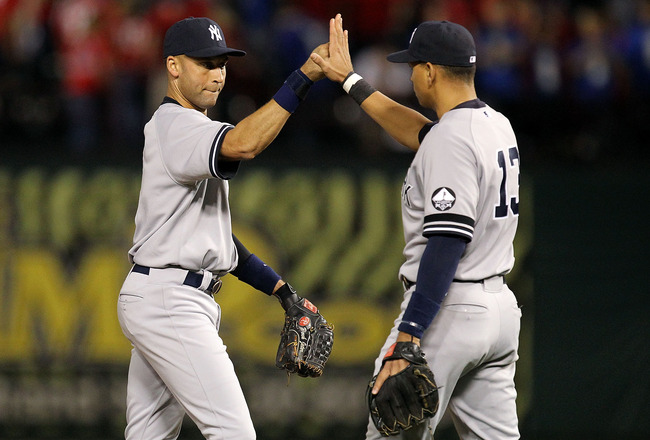 Ronald Martinez/Getty Images
Ronald Martinez/Getty Images Protagonist and antagonist. Hero and villain.
Every novel has them, even poorly-written ones. In many stories, they are easily defined.
But what happens when it becomes difficult to delineate which is which?
It seems that the great stories—the ones that remain in our psyche—have a protagonist-antagonist dynamic that leans toward this type of ambiguity, causing tension and making us wonder: Who is the good guy?
In the sports world, the New York Yankees are a living narrative, rivaling any classic prose in print. Their fabled history is lined with heroic characters matching those thought up by Homer (the Greek poet, not the bumbling patriarch in the cartoon series).
The mere mention of “the Yankees” evokes a visceral response. It seems like everyone has an opinion—from the stage of Broadway in the play Damn Yankees, to the streets of Boston with the omnipresent “Yankees Suck!” chant.
Regardless of whether you love or hate the Yankees, all must concede that the team is as much an American institution as Fourth of July and Harley Davidson motorcycles.
Although many have played for the New York Yankees, it is the feats of their titans that create the persona of an organization that is woven not only into the fabric of baseball, but also into the tapestry of American folklore.
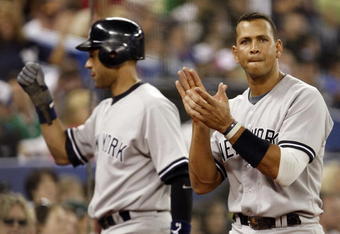 Abelimages/Getty Images
Abelimages/Getty Images Within the Yankee continuous story, a constant protagonist-antagonist tension emerges eternal, with only the names changing.
Babe Ruth-Lou Gehrig
Mickey Mantle-Roger Maris
Thurman Munson-Reggie Jackson
Throughout the decades, Yankee fans have chosen sides and picked their favorites, sparking debate.
The current Yankee chapter is no different. Today it is Derek Jeter and Alex Rodriguez filling the roles.
From the Ashes Rises the Phoenix
This tale begins in the decade of the Eighties, a time when George Steinbrenner’s micromanaging ways were no longer amusing as the Yankees were playing second fiddle to the Mets.
It seemed that the entire organization was stuck on one sheet of music, namely Steinbrenner’s managerial hokey-pokey.
You put a Billy Martin in, you take a Yogi Berra out
You put a Lou Piniella in and you shake it all about...
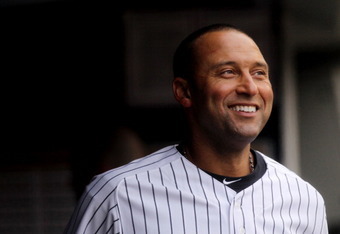 Nick Laham/Getty Images
Nick Laham/Getty Images Yes, Steinbrenner’s meddling created a Yankees’ personality dysfunction that made Sybil’s disorder look monochromatic by comparison.
In 1990, Steinbrenner was eventually banned by Fay Vincent from the day-to-day operations of the team.
Unfortunately for certain players—specifically Don Mattingly and Dave Winfield—that era was a case of being in the right place at the wrong time. Both of them left New York without a ring. Winfield also left with a bitter taste in his mouth.
As the saying goes, however, it’s always darkest before the light. For Yankee fans, the team was about to leave the shadows of the forest primeval and enter back into the spotlight of relevancy.
Under the charge of disciplinarian Buck Showalter, the Yankees improved vastly. They were in first place before the strike ended the 1994 season and made the playoffs in 1995.
However, Showalter’s act grew old and his downfall came after an early exit in the 1995 ALDS.
Enter Joe Torre, a man with a different, more player-friendly approach.
Also enter Derek Jeter, a young man with GQ good looks and a charming disposition. He was just what the Yankees needed—a new poster child for the organization.
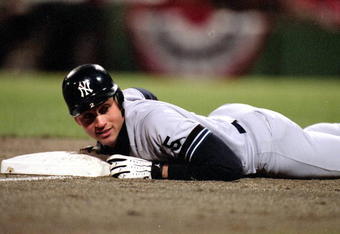 Doug Pensinger/Getty Images
Doug Pensinger/Getty Images A perfect storm of managerial prowess, veteran leadership and youthful energy led the Yankees to a World Championship in 1996.
Jeter played well in the playoffs. He topped off the world championship sundae with a plump maraschino cherry—Rookie of the Year honors.
Gotham had found its new prince.
And this prince was a conqueror, leading the Yankee juggernaut to three more championships to close out the Nineties and usher in the new millennia. Jeter ended the 2000 season with a World Series MVP.
The Yankees appeared to be invincible…until 2001.
That year, they lost a heartbreaker to the Arizona Diamondbacks in the World Series. Derek Jeter struggled, hitting a lowly .148.
In 2002, they lost in the ALDS to the Anaheim Angels, the eventual World Champions. Jeter redeemed himself by hitting .500 and finishing with an OPS of 1.401.
They returned to the World Series in 2003 after beating the Boston Red Sox in a thrilling ALCS, but lost to the Florida Marlins, a team with a Lilliputian payroll.
Although other organizations would have been happy with this success, the Yankees and their fans demanded more. Clearly, for those residing in Yankee Land, something had to be done.
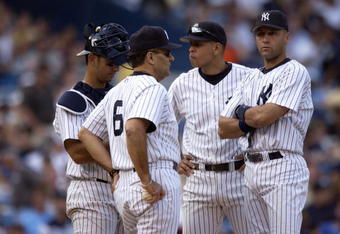 M. David Leeds/Getty Images
M. David Leeds/Getty Images
Paradise Lost
In the early part of 2004, an opportunity to make the Yankee beast even stronger occurred.
A trade involving Alex Rodriguez between the Texas Rangers and Boston Red Sox fell through. That left the door open for the Yankees.
In Rodriguez, the Yankees scored a player fresh off an MVP season. Furthermore, Rodriguez, a Gold Glove-winning shortstop, agreed to move to third base, in deference to the wildly popular Jeter.
All seemed right again in the Bronx.
That is, until the 2004 ALCS against the Red Sox. Depending on your perspective, what happened next was either a miraculous comeback or a colossal self-destruction
Suddenly, up three games to none in the series, the Yankees bullet train turned into a rickshaw. They proceeded to lose the next four games, losing the seventh game in embarrassing fashion, 10-3. The Yankees became the first team in MLB history to lose a series after being up three games to none.
Neither Jeter nor Rodriguez played exceptionally well in that series, but it was Rodriguez who faced the greater scrutiny.
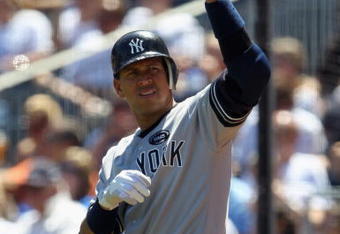 Jamie Squire/Getty Images
Jamie Squire/Getty Images After all, Jeter had won championships surrounded by lesser talent than the 2004 Yankees had. And Jeter didn’t have a record-setting contract.
From 2005 to 2007, the Yankees never advanced past the ALDS, despite Rodriguez winning the MVP award twice in that time span.
What was happening?
Could it be Rodriguez?
Were the Yankees suffering because of his presence?
During that World Series drought, Rodriguez became a target. Some of the reasons were due to circumstance; other reasons were of his making.
In 2007, an article by Selena Roberts in the New York Times stated “He [Rodriguez] was once privately nicknamed ‘the cooler' by his teammates in Texas for his habit of turning a hot team tepid.”
Committing a public relations’ faux pas, agent Scott Boras announced during the fourth game of the 2007 World Series that Rodriguez opted out of his contract. This proclamation came moments before the Red Sox completed a sweep of the Colorado Rockies.
Overplaying his hand with the move, Rodriguez was left to the mercy of the Yankee management, who helped him save face by signing him to a contract larger than the previous one.
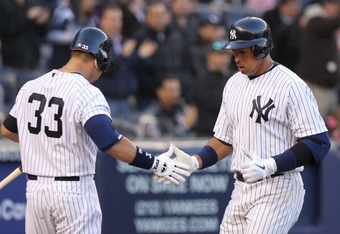 Nick Laham/Getty Images
Nick Laham/Getty Images It seemed that Rodriguez had become his own worst enemy and, in the process, developed into the antithesis of Derek Jeter.
After failing to make the playoffs in 2008, the Yankees needed to make a move, and fast. Things were quickly eroding.
During that offseason, the Yankees made a huge media splash and a galactic financial commitment by signing the top three free agents on the market: CC Sabathia, Mark Teixeira and A.J. Burnett.
The World Series was theirs to lose.
The pressure was on, especially for Rodriguez. Unlike Jeter, who already had four rings, Rodriguez had something to prove. His post-season batting average hovered around the Mendoza Line.
Then came a double-whammy for Rodriguez.
Before the 2009 season, Joe Torre’s book, The Yankee Years, hit bookstores. In it, Torre stated that Rodriguez was known as “A-Fraud” by Yankee teammates.
Around that same time, the aforementioned Roberts and David Epstein reported in an article in Sports Illustrated that Rodriguez had used performance-enhancing drugs in 2003.
Predictably, by the end of the 2009 MLB season, the Yankees won the World Series. Rodriguez played well during that playoff run, hitting over .400 in both the ALDS and ALCS, and finishing with 6 HR and 18 RBI.
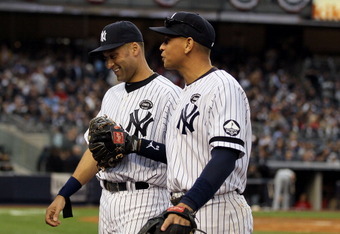 Jim McIsaac/Getty Images
Jim McIsaac/Getty Images However, even in victory, Rodriguez had lost. Everything that he had accomplished up to that point was now questioned. He couldn’t escape his legacy. He was tainted goods.
Meanwhile, Jeter remained revered by Yankee faithful. He had gone through the decade unscathed.
The Sun Also Sets
Up until the 2010 season, Jeter and Rodriguez fell neatly into protagonist-antagonist roles, respectively. It was easy to pick out the hero and the villain.
But something happened in 2010 that made things interesting—Jeter had his worst year statistically. He was also in the final year of his contract.
Conversely, Rodriguez was signed to what seemed like perpetuity. He wasn’t going anywhere.
The Yankees were faced with a conundrum: Sign an aging player and watch him decay at shortstop or face a public relations nightmare by letting him walk away. In the end, they had no choice. The Yankees chose the former, but with visible outward reluctance.
It was obvious to everyone that Jeter was being paid for past performances, even though it wasn’t necessarily in the best financial interest of the club.

